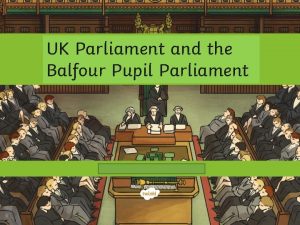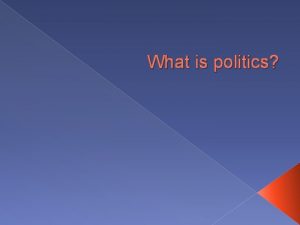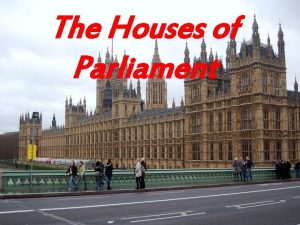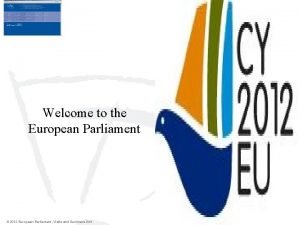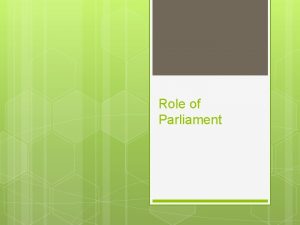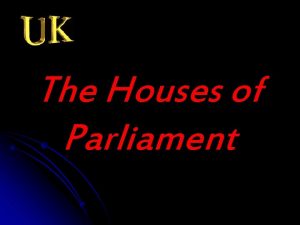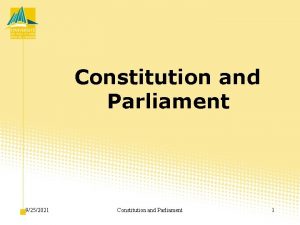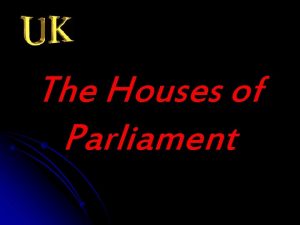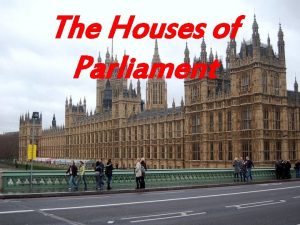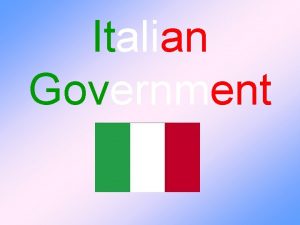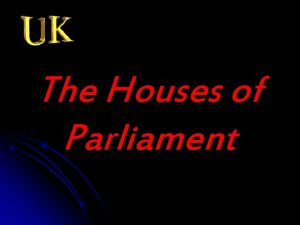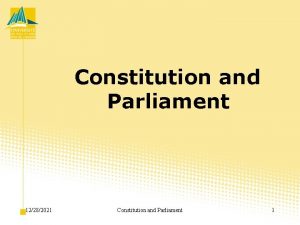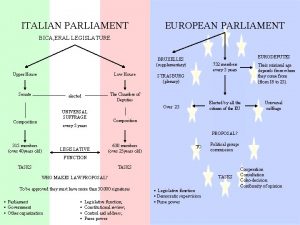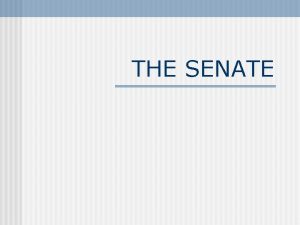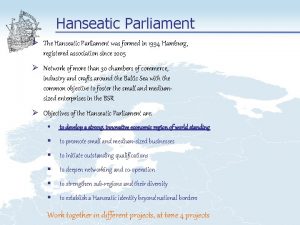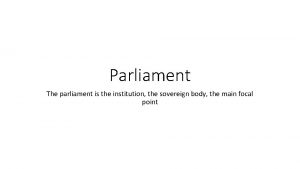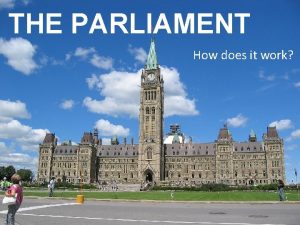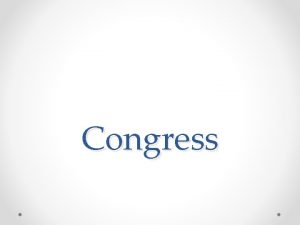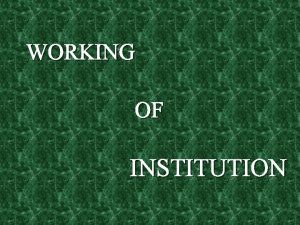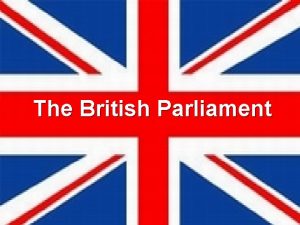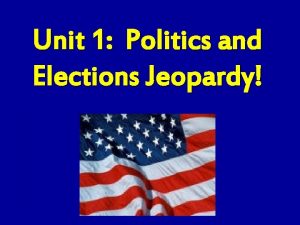Parliament POLITICS UNIT 2 PARLIAMENT MAKES UP THE































- Slides: 31

Parliament POLITICS UNIT 2 - PARLIAMENT MAKES UP THE LEGISLATURE IN THE UK IT MAKES LAWS LEGITIMATE THROUGH CONSENT

A (very!) brief history of Parliament �Charles I was executed in 1649 by Parliament for trying to govern on his own rather than with the help of Parliament. At this time whilst Parliament insisted on being consulted, it’s role was subordinate to the monarch and continued to be so for many years. In fact, today many people feel it remains subordinate but to the government rather than the monarch. �After the Glorious Revolution in 1688 the main source of power was changed from the monarchy to Parliament and it’s role has since then slowly evolved to what it is today. �In 1720 the cabinets most senior figure became known as the Prime Minister and began to take on more power.

Parliamentary vs. Presidential Government Parliamentary government: � Parliament is the main (in the UK only) source of political authority. Political power may only be exercised if it has been authorised by Parliament. � The government must be drawn from Parliament (either Commons or Lords) � There is no strict separation of powers, the powers of the legislative and executive are fused. � The government is accountable to Parliament. Presidential government: � The legislature and the executive (the presidency) have separate sources of authority, they are elected and appointed separately. � The President is not part of the legislature � The President is directly accountable to the people, not to the legislature � There is a clear separation of powers as outline in a codified constitutional arrangement.

Parliamentary Sovereignty Parliament is legally sovereign, which means: �It’s the source of all political power. In effect Parliament does delegate many of it’s powers to ministers, devolution etc. but can always reclaim these powers. �It’s omnicompetent, capable of passing any act with a majority vote in Commons. Any law it passes must be enforced by courts and authorities. �It is not bound by its predecessors and any existing laws can be amended or repealed. �Equally, it can not bind it’s successors and it’s laws can not be entrenched against any future change. �De jure

Parliamentary Sovereignty However if we consider political sovereignty we can certainly claim that Parliament has lost much of it’s sovereignty. Political sovereignty is where power lies in reality, not legally; it is the practical location of power. It is often said ‘the sovereignty of Parliament is, in reality, the sovereignty of the majority party. ’ The government has a mandate to carry out it’s manifesto policies which Parliament can not really prevent. Political sovereignty lies with people at elections and government in between. In reality, despite Parliament’s reserve powers to reverse any change, much of the political sovereignty of this country rests with the EU. De facto

The erosion of Parliamentary Sovereignty �A lot of legislative power has moved to the EU. European law is superior to British law so in a conflict British law prevails (factortame) �Executive power has grown and so political sovereignty has been transferred to the government �Increased referendum use for any major constitutional change e. g. 2011 AV referendum effectively returns sovereignty to the people �Devolution e. g. Scottish Parliament and Welsh Assembly. It is difficult to imagine circumstances where the powers that have been granted would be removed (although, theoretically this could happen)

The Structure of Parliament It’s divided into 3 parts: 1. House of Commons – also known as the Lower House or Senior Chamber (sounds contradictory I know!) 2. House of Lords – Upper House / Subordinate Chamber 3. Queen-in Parliament – a ceremonial role only. The Queen is not welcome in Parliament other than when she is opening the new session in Parliament. The monarch is not ever allowed in the House of Common. But legislation can only become legitimate if it has Royal Assent. However this has not been refused since 1707 with Queen Anne, who was quickly ‘persuaded’ to agree with Parliament.

Functions of Parliament • • Legitimation Scrutiny Opposition Accountability Financial Control Representation Redress of Grievances • Private Members Legislation • Reserve Powers • Lord’s specific powers AND ITS LIMITATIONS

Legitimation For any law or executive action to be implemented they require Parliamentary sanction. This grants popular consent indirectly as Parliament and it’s representatives are meant to act on behalf of the people. This is also known as promulgation. Limitations: - House of Lords is not elected and therefore how can it give legitimacy on behalf of the people? - Commons is dominated by the executive and therefore can not be independent. It is bound to pass government laws. - The electoral system (FPTP) means that Commons is not representative proportionally of the electorate’s votes.

Scrutiny Parliament, in particular the House of Lords, scrutinises all proposed legislation. This involves close inspection and the proposal of amendments to improve the bills. The scrutinising function is carried out by plenary sessions of both Houses. This is not about blocking legislation but improving and refining it. Limitations: - Neither house has enough time to consider bills thoroughly - Standing committees are whipped and so fall under government control thus reducing their ability to independently look at legislation. - They are also made up in proportion to the number of seats per party on Commons which further reduces their ability to scrutinise independently.

Opposition As governments nearly always enjoy a majority in Commons opposition does not imply the defeat of government proposals. Opposition is more of a ritualised process for example at Prime Minister’s Question Time. Parliamentary politics is expected to be adversarial and it is beneficial that government policies are robustly challenged. Opposition parties expose any weakness in the government or it’s policies and so the government is forced to prepare it’s case thoroughly. Limitations: - The executive dominates Parliament - Opposition has become ritualised

Accountability Parliament is meant to act on behalf of the public which means forcing the government to justify their policies and it’s effects, presenting alternative policies and exposing any errors. This happens in several ways for example: � Questions to ministers – MPs question senior ministers freely without the existence of a party whip � Select committees – less ritualised than questioning ministers and questioning can go on for as long as necessary. Questioning is thorough and extensive, MPs are experts in particular areas, and specialist witnesses can be called in. � Debates on legislation – every piece of legislation is debated in each House at least twice. Limitations: - Questions to ministers are ritualised and this prevents serious discussion rather than political point scoring. - Select committees are made up in proportion to seats in Common so they will tend to agree with government proposals. - There is not enough time to properly debate any legislation and MPs are under the authority of whips

Financial Control A government must be able to collect and spend taxes. The operation of the Public Accounts Committee considers the effectiveness of all government expenditure, it’s members feel they represent they interests of the taxpayers and try to ensure they get value for money. Limitations: - As it’s so critical it’s customary for Parliament to renew financial powers without obstruction. - The House of Lords has long since lost any powers over financial affairs due to the Parliament Act of 1911

Representation Parliament must represent the interests of their constituents, local MPs typically become active in decisions to build by-roads, power stations etc. in their communities. Both House are meant to represent the best interests for society as a whole by doing what they perceive is in the nation’s best interests. 75% of MPs are either paid a retainer to represent an outside group or regularly support the interests of a specific group without payment. MPs must declare this openly. It is a completely legal, integral part of Parliament and a form of their representation. Limitations: - MPs are expected to reflect their party. They are whipped and must ‘toe the party line’ which often conflicts with them truly representing the best interests of the public or their constituencies. MPs can not act freely which undermines their representative function. - Neither House is socially representative, women, minorities and younger adults are seriously under represented by Parliament. - The electoral system means Commons does not proportionally reflect the electorate’s vote - The House of Lords is unelected

Redress of Grievances Constituency MP links. A constituent may complain to their MP when they feel they have been unfairly treated by the government or one of it’s agencies such as the NHS, Police etc. Every person in the country has an MP they can turn to with such issues and MPs are expected to help with the cases they feel are appropriate. The Parliamentary Ombudsman also fulfils this function Limitations: - MPs, especially ministers, may lack time to deal with the grievances of many constituents and so these problems will go unaddressed.

Private Members’ Legislation A few MPs who win an annual ballot are allowed to present their own private legislation to Parliament. Occasionally these get passed, most notably the 1967 Abortion Act legalising abortion. Limitations: - These are usually blocked immediately by the government - Only a handful of MPs get chosen to present their own legislation (through a ballot system) and governments dissuade these MPs from proposing anything.

Reverse Powers Parliament can veto legislation and dismiss a government (James Callaghan was dismissed with a vote of no confidence in 1979). If Commons reject a bill however that is the end of the matter. In this way they are said to have strong reserve powers, these kinds of things do not happen very often however they are possible. Limitations: - Lords it the only house which is not dominated by the governing party of under the authority of whips and they do not possess these reserve powers. If the Lords rejects legislation it can be passed regardless a year later. - Reserve powers are incredibly rarely used in Commons as it is whipped and dominated by the executive

Specific Lords Power of Delay – the House of Lords can delay any legislation for a year. They can do this fairly regularly if they feel it is appropriate because the whips have less power in the Lords and there are many independents. This forces the government to think again and the threat of such a large delay may force the government to compromise on amendments. 2. Amending – debating and proposing various amendments also delays bills as every amendment must be confirmed by Commons. Sometimes a Bill (especially ones the House of Lords don’t like) will be sent back and forth between Houses. This process is known as ‘ping-pong’ 1.

The workings of Parliament VARIOUS FEATURES OF PARLIAMENT THAT AID THEIR FUNCTIONS

� Plenary Sessions – this is when a House meets in full. This is very rare and there aren’t even enough seats for everyone! Commons is usually full at PMQT or when there is a 3 line whip on very important issues. � Standing Committees – temporary committees are specially formed for each separate bill. They have 15 -50 members made up of MPs, Peers and a relevant government minister. Amendments to legislation are debated and voted for by these committees. The governing party is always granted a majority on committees and party loyalty is expected to apply in committees. It’s unlikely for an amendment to succeed against government wishes.

Departmental Select Committees � Concerned with a specific area of government responsibility e. g. Defence, � � � Transport, Work & Pensions etc. They have 11 members selected by the parliamentary liaison committee often based on their experience in this area Members are expected to behave in an non-partisan, neutral way Unanimous support for amendments and conclusions are usually gained which means reports carry significant weight and are often accepted They can call ministers, civil servants and external witnesses however they can not force them to attend (Edwina Curry famously refused to attend a departmental select committee) They investigate the work of government departments and consider major policies determining whether they are well considered and have taken a range of opinions into account. They occasionally propose future legislation where there is a need to. E. g. the Home Affairs Committee issues a report on the ‘Detention of Terrorist Suspects’ in 2006 which rejected the proposed 90 day detention period without trial for terrorist suspects. They recommended a maximum 28 day detention period instead. It’s proposals were accepted.

� Parliamentary Ombudsman – investigates complaints from MPs on behalf of their constituents. MPs no longer really have time to deal with complaints themselves so this is the body which does so. They receive about 2, 000 complaints a year. � Public Accounts Committee – very independent body that investigates the financial arrangements of the government and checks that public spending has been used for the purposes intended and is as cost-effective as possible. � National Audit Office - looks at all areas of government work in each department to ensure maximum efficiency e. g. in the NHS, tax authories etc.

The House of Lords

House of Lords � The government do not normally have a majority in the House of Lords � There are many non-party ‘cross-benchers’ who act independently � Made up mainly of life peers now who have been appointed on political grounds e. g. � � important ex-judges, ex-ministers etc. The legal profession, the judiciary and the Church of England are strongly represented There are still 92 hereditary peers who were voted in to remain however these will eventually be removed New Peers are suggested by the House of Lords Appointments Commission, an independent body established in 2000 and political parties. The Commission recommends individuals for appointment as non-party-political life peers. It also vets nominations for life peers that have come from political parties to ensure there is no corruption. Once approved by the prime minister, appointments are formalised by the Queen. In 2012 the Membership is: Labour - 235 Conservative - 214 Crossbench - 186 Lib Dem – 90 Other – 32 Bishops – 25

House of Lords Reform � 2011: Deputy Prime Minister presents Parliament with the House of Lords Reform Draft Bill in � � � May. 2007: The Government published its White Paper, The House of Lords: Reform, setting out the policy for a hybrid House of Lords with 50 per cent elected members and 50 per cent appointed members. In March, the House of Commons votes on the options for composition supporting an elected House of Lords. A week later the House of Lords votes on composition favouring a fully elected House. 2002: A joint committee is appointed to consider House of Lords reform in May 2002 and reappointed at the start of the new session in November 2002. It publishes House of Lords Reform: First Report in December. 2001: The Queen confirms her intention to create 15 new non party-political House of Lords members. 2000: The independent House of Lords Appointments Commission is established to recommend approve suitable candidates for membership. 1999: The House of Lords Act receives Royal Assent, reducing the number of hereditary peers by more than 600 and freezing the number which remains at 92 until further reform (92 is roughly 1/8 th of hereditary peers) 1997: After the general election, the Labour government announces a bill to remove the automatic right of hereditary peers to sit and vote in the House as ‘the first stage in a process of reform’. This is partly because in 1988 when Thatcher was trying to push through poll tax she faced serious opposition from Lords. Thatcher therefore persuaded large number of hereditary peers to turn up and vote in line with what she wanted. Many of these people had never voted before in their lives and the Labour government never forgot it.

Examples of what they have done Some notable examples of when the House of Lords has defied the will of Commons. � 1998 regarding the age of consent for homosexual males. Lords were against lowering the age of consent for homosexual males from 18 to 16. They delayed the legislation however in 2000 the government forced the Bill through regardless � 2001 Anti Terrorism Legislation. The Lords defeated the government on ten occasions proposing key amendments that were then accepted to improve the legislation � 2005 Anti Terrorism Legislation. The Lords insisted that it was unacceptable to detain suspected terrorists without trial for 90 days. They delayed and debated legislation and in the end the government accepted amendments

Lords strengths and weaknesses • Many members of the Lords are more independent from party control e. g. whips than MPs. Their neutrality means they can be more effective in controlling government. • Peers represent a wide variety of interests and valuable expertise as the House of Lords is largely made up of prominent citizens with considerable special experience for example chief surgeons, supreme judges etc. • The Lords can delay legislation and so force compromises by the government • The Lords has more time to conduct debates and to scrutinise legislation than the Commons does • In its current state the Lords lacks democratic legitimacy as it is not elected • The powers of the Lords are carefully limited by law. It can’t exercise any control over financial matters or permanently veto legislation. Arguably a weak body • Any of it’s proposed amendments can be over turned by the House of Commons • The Lords, like the Commons really, has a very limited role in developing legislation

A fully elected second chamber Arguments for: ü It is more democratic than current arrangements giving it more legitimacy ü Will eliminate any corrupt practices in relation to the appointments to the Lords e. g. people paying parties a lot of money to appoint them ü If elected it may act as a democratic balance against the power of government. This is especially true if it was elected using PR so no party would win an overall majority. This reduces party dominance ü If elected using PR it would give small parties representation ü Provides a stronger/better limit on the powers of the first chamber. ü Gives citizens an additional channel for seeking a redress of grievance or change of public policy Arguments against: v If an elected chamber simply mirrored commons it would create a deadlock/ power struggle between the two houses. Once given more legitimacy through the vote people argue that the House of Lords will want more power than they currently have. If it mirrors the makeup of Commons there would be no balancing effect v Too many elections may lead to voter fatigue and therefore apathy v It might simply become another house dominated by whips and the party lime v It would reduce the level of expertise within Parliament which means they would be less able to scrutinise Bills effectively v May damage the number of crossbenchers who stand thus meaning the executive dominate both houses. v A more powerful second chamber may lead to a less decisive and less powerful government v Elections tend to favour white, middle-aged, male candidates meaning it wouldn’t be socially representative

An appointed second chamber Arguments for: ü It is an opportunity to bring a wide variety of people into the political process, some of whom would not want to stand for election ü The level of experience/expertise is hugely helpful e. g. chief doctors and surgeons for medical matters, head of MNCs for business matters, top judges and lawyers for legal matters etc. ü Can bring many political independents, and with them neutrality into the political process. This is representative in that a high proportion of the country do not firmly support one party either, despite their interest in politics. ü The membership of Lords could be controlled to make sure that all major groups and sections of society could be represented ü Not dominated by government i. e. through the inclusion of back benchers Arguments against: v It could put too much power into the hands of those responsible for appointing members which can lead to corruption. If up to the Prime Minister it could greatly enhance his already large powers v It is fundamentally undemocratic and holds back a progressive, liberal system. v The public play no part in their appointment and so Lords may lack legitimacy. v Limited powers e. g. Salisbury convention, 1911 Parliament Act so may not be as effective a balance on Commons and the government as they could be with more powers.

Abolition of the House of Lords/ have a unicameral system Arguments for: ü It would save money ü It would streamline the legislative process ü It would remove obstructions to efficient governments meaning governments could quickly implement important proposals. ü Many people argue the House of Lords has limited powers anyway and therefore there wouldn’t be much difference ü More democratic Arguments against: v It provides an important check on government power which would be too unsupervised without this which could potentially be dangerous. Parliament would lose it’s ability to hold governments to account as effectively v The expertise of the second chamber which enables successful scrutiny of legislation would be lost v There would not be enough time to debate or look at all legislation, Lords is where the in-depth scrutiny is done v Commons is dominated by the executive which the Lords is not so abolishing the House of Lords would mean that any government which got in would be able to pass basically any legislation easily, no matter it’s consequences.

Thank you : ) SORRY IT’S LONG BUT I WANTED TO BE THOROUGH LET ME KNOW WHAT YOU THINK?
 Unit 1 intro to government review guide
Unit 1 intro to government review guide Unit 6 review questions
Unit 6 review questions Hát kết hợp bộ gõ cơ thể
Hát kết hợp bộ gõ cơ thể Slidetodoc
Slidetodoc Bổ thể
Bổ thể Tỉ lệ cơ thể trẻ em
Tỉ lệ cơ thể trẻ em Gấu đi như thế nào
Gấu đi như thế nào Tư thế worm breton là gì
Tư thế worm breton là gì Hát lên người ơi alleluia
Hát lên người ơi alleluia Môn thể thao bắt đầu bằng từ chạy
Môn thể thao bắt đầu bằng từ chạy Thế nào là hệ số cao nhất
Thế nào là hệ số cao nhất Các châu lục và đại dương trên thế giới
Các châu lục và đại dương trên thế giới Công thức tính độ biến thiên đông lượng
Công thức tính độ biến thiên đông lượng Trời xanh đây là của chúng ta thể thơ
Trời xanh đây là của chúng ta thể thơ Mật thư tọa độ 5x5
Mật thư tọa độ 5x5 Làm thế nào để 102-1=99
Làm thế nào để 102-1=99 Phản ứng thế ankan
Phản ứng thế ankan Các châu lục và đại dương trên thế giới
Các châu lục và đại dương trên thế giới Thể thơ truyền thống
Thể thơ truyền thống Quá trình desamine hóa có thể tạo ra
Quá trình desamine hóa có thể tạo ra Một số thể thơ truyền thống
Một số thể thơ truyền thống Cái miệng bé xinh thế chỉ nói điều hay thôi
Cái miệng bé xinh thế chỉ nói điều hay thôi Vẽ hình chiếu vuông góc của vật thể sau
Vẽ hình chiếu vuông góc của vật thể sau Biện pháp chống mỏi cơ
Biện pháp chống mỏi cơ đặc điểm cơ thể của người tối cổ
đặc điểm cơ thể của người tối cổ V cc
V cc Vẽ hình chiếu đứng bằng cạnh của vật thể
Vẽ hình chiếu đứng bằng cạnh của vật thể Vẽ hình chiếu vuông góc của vật thể sau
Vẽ hình chiếu vuông góc của vật thể sau Thẻ vin
Thẻ vin đại từ thay thế
đại từ thay thế điện thế nghỉ
điện thế nghỉ Tư thế ngồi viết
Tư thế ngồi viết
































